The Tour of the Basque Country is on this week and a chance to take a closer look at this region which is one of the hotbeds of cycling in Europe. It’s packed with clubs, pro teams, races, knowledgeable fans and berets.
Basque Country vs Basque country: the Basque Country has been a live political topic for centuries and today the summary version is that there is a defined administrative region in Spain with a population of about 2.1 million. There is also a wider Basque country which includes the Spanish region of Navarre as well as areas in France along the border.
Sport is big in the Basque Country: the biggest sport is football and this arrived in part because of trading links on the Atlantic to Britain. The inaugural Copa del Rey soccer competition was won twice by Athletic Bilbao and in 1909 the same trophy was won by… the San Sebastiàn Cycling Club, better known today as Real Sociedad. In reality the bay city of San Sebastiàn (Donostia in Basque) had a general sports club with cycling, football and other sections and an admin mix-up meant the cycling team got entered but the footballers won, not the cyclists.
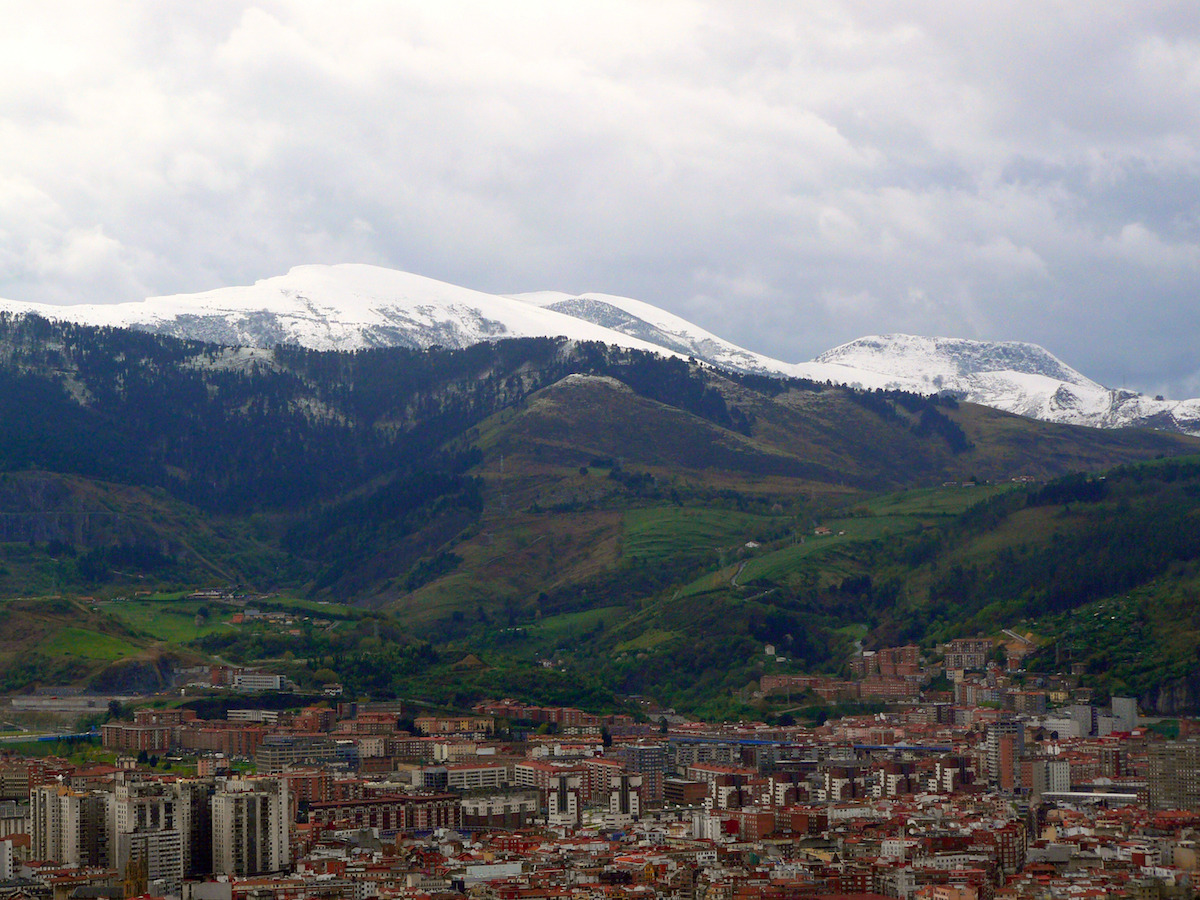
Cycling runs a close second to football. What made cycling so popular? As ever there’s more than one factor but industrialism and the large workforce that accompanied the factories were central. The region’s capital biggest city is is Bilbao (pictured), a port city which took off in the 19th century thank to abundant reserves of iron ore. A lot of this precious material was exported but in time Bilbao became a major producer of iron and steel. This made the region wealthy and also gave rise to industries like shipbuilding and armaments. You didn’t come here for an economic history of the Basque region but the point here is that these industries created the roots of the flourishing cycle culture. First the production of rifles led to expertise in steel tubing which in turn allowed several Basque bicycle manufacturers like Orbea and BH to succeed. Second the large population of workers needed transport to get to work and so the bicycle was quickly adopted and, as so often, some went from commuting to the factory to riding at weekends.
Mountains: the geography doesn’t make it easy to get into cycling. The region is mountainous with the Pyrenees to the east and the Cantabrian mountains to the west (the Lagos de Covadonga etc) and if the highest peak is 1,551 metres above sea level the landscape is corrugated with wooded hills. It’s similar to the Apennines in central Italy only wetter, the proximity to the Atlantic means this is a lush region. This is compact chainset territory and even the pros in the Tour of the Basque Country run special low gears.
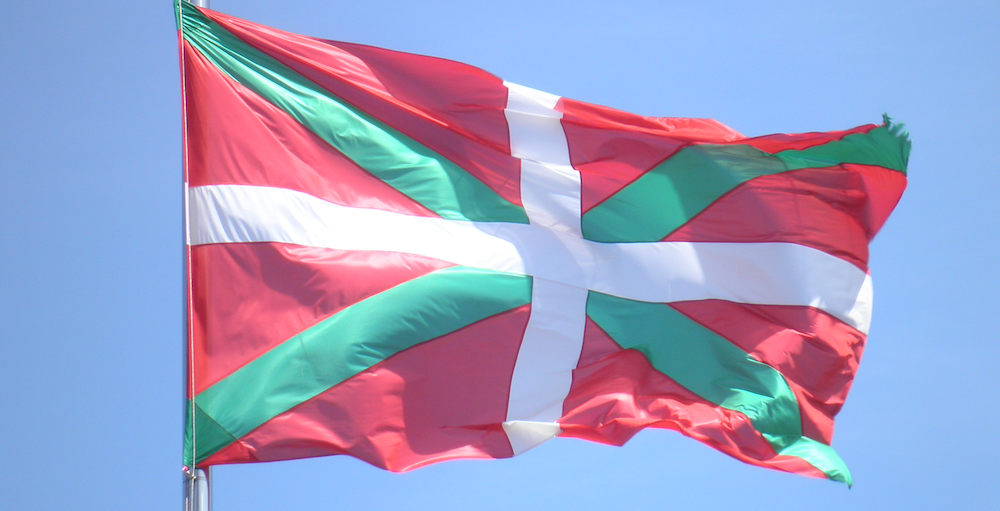
Nationalism and regional identity have long played a part. It seems no coincidence today that the Spanish regions with the strongest polling for independence, the Basque Country and Catalonia, are the ones that retain their own World Tour stage races alongside the Vuelta a España and Spain’s only major one day race is the Clasica San Sebastiàn. The Vuelta itself for years wasn’t the full tour of Spain because it stayed away from the Basque country following protests in 1978 and fears that it would not be safe to return; the race was bombed when it visited the region in 1968. The Tour de France also had its scares with bombs and arrests in the Pyrenees too. But in 2011 the Vuelta returned to the region and as ex-pro and journalist Pedro Horillo said “For the Vuelta this signifies a return to its roots. The Vuelta was organised by a paper from here” with reference to the El Correo Español-El Pueblo Vasco (“The Spanish Post – The Basque City”) newspaper that ran the race from 1955 to 1978. In fact the first three editions of the Vuelta were really a race from Eibar in the Basque Country to Madrid and back.
Knowledgeable fans: the Tour of the Basque Country is well supported by locals every year and one reason behind the large crowds sometimes seen at Spanish races is high unemployment (currently 18% across Spain) then this might still be a factor but the region has a significantly lower unemployment rate than the nation. Instead the locals are passionate about cycling and often knowledgeable too and anecdotally the region is similar to Flanders in that your average citizen in the street actually knows something about the sport. The likes of France and Italy can have their grand tours but this doesn’t translate into year round popularity, ask an Italian to name a cyclist and they’d probably say Marco Pantani rather than Vincenzo Nibali.
The Tour of the Basque Country: arguably it’s the stage racer’s stage race. Winning any stage race is a feat especially in the World Tour but this one seems to command particular respect from peers who know the severity of the course.
Language: Basque is an original language and if you watch the Tour of the Basque Country or the Clasisca San Sebastiàn chances are the on-screen captions confuse. Don’t worry because Euskara, the Basque language, has confused linguistics experts because it has no obvious roots in another language, ie it can’t be traced back to, say, Latin, Greek or Celtic. Within the region today there are various dialects but most if not all locals speak Castilian Spanish.
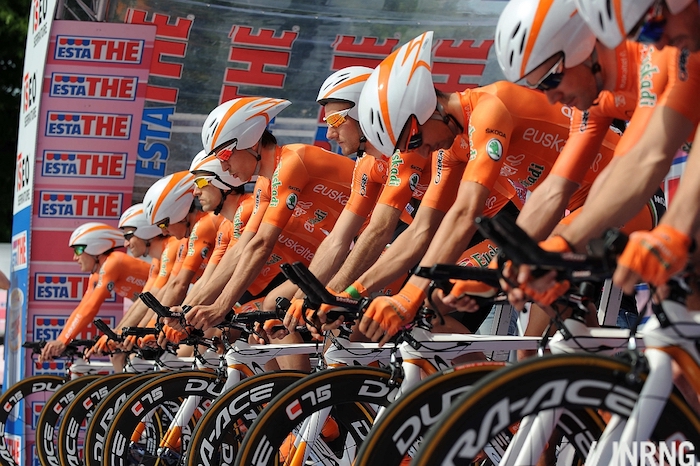
Euskadi and Euskaltel: For 20 years Basque cycling was exported via its own team and chances are for many readers Basque identity is not the green, white and red ikurrina flag but the orange lycra of the Euskaltel team, dressed in Exteondo clothing of course, another local brand. They started out in the colours of the Basque flag thanks to a crowdfunding project where supporters subscribed to keep the team on the road but in time they adopted the colours and name of a regional telecoms operator.
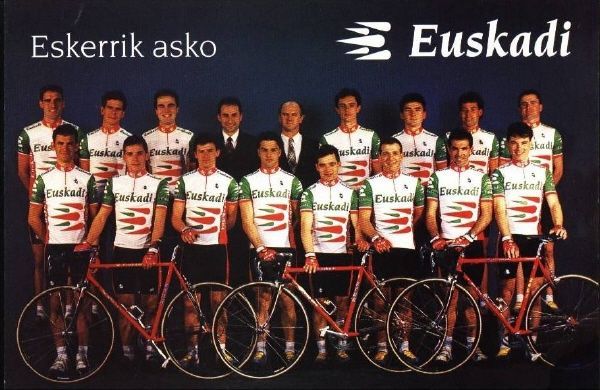
Like some local football clubs the team had a policy of recruiting only local riders. This swept wide to include the likes of Romain Sicard who comes from the French Basque Country and Samuel Sanchez, a rider from Oviedo in the Asturias region but who since moved a village outside Bilbao making him an adopted local. The original idea behind the team was to promote the region and give local talent a chance and to wear the Basque colours but there was a deliberate choice to distance the project from the more vocal, hardline elements of Basque nationalism. Only the team could only go so far, its regional sponsorship couldn’t rival global brands in the World Tour and the team ended in 2013 after an absurd final year where they ended up hiring Russian, German, Slovenian and Moroccan riders with UCI points in a bid to retain their World Tour status.
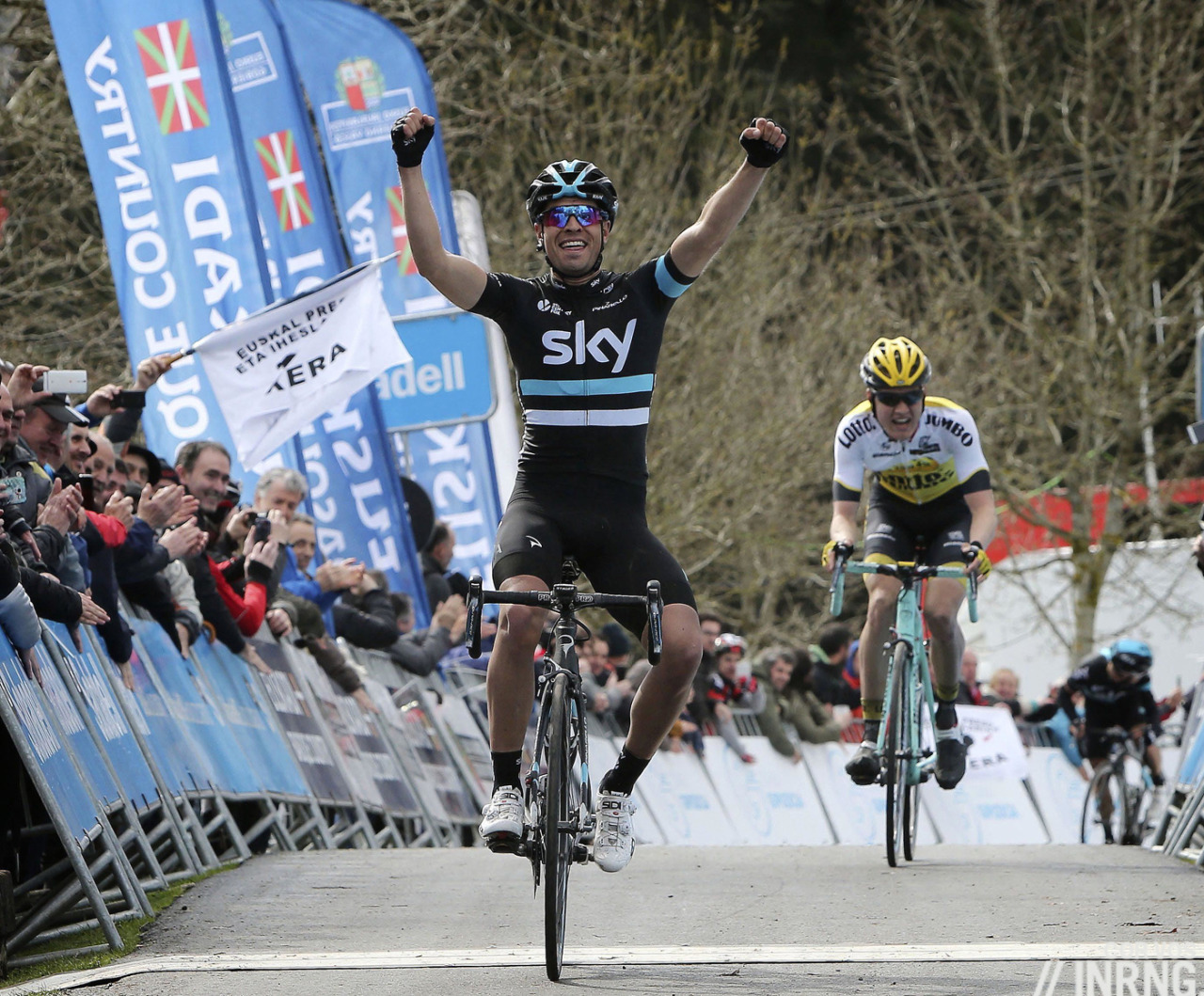
Ironically today’s best Basque riders have plenty of points between them. Mikel Landa, David Lopez, Mikel Nieve and Beñat Intxausti at Team Sky (even if Nieve is from Pamplona in Navarre and the Inxausti has been out with mononucleosis for ages); Ion Izagirre at Bahrain-Merida; Igor Anton and Omar Fraile at Dimension Data; Markel Irizar and Haimar Zubeldia ride for Trek-Segafredo and Movistar have Jonathan Castroviejo, Gorka Izagirre and Pamplona’s Imanol Erviti. This isn’t an exhaustive list either, just an illustration but it’s impressive for one area of Spain. There are concerns about the conveyor belt continuing. Not along ago the likes of Romain Sicard and Loïc Chetout would head to Spain to ride for amateur teams in the Basque Country on their way to the pro ranks but now some Basque riders are riding for amateur squads in south-western France as their route to the pro ranks. Still Spain’s pyramid of teams seems Movistar at the top, Caja Rural in the Pro Conti ranks and of the two continental teams there’s the Euskadi Basque Country-Murias team.
Away from the pro ranks this is a rewarding area to ride, at least if you like a climb or two. The roads are packed with cyclists on a Sunday morning too. Ride enough and you can treat yourself to pintxos, the local version of tapas and which exploits ingredients from the region which, because of the ocean and the mountains, have a lot of variety.
Homes of cycling? With luck this will become a short series looking at other regions of Europe where the sport is popular, from Brittany to Flanders to Lombardia.

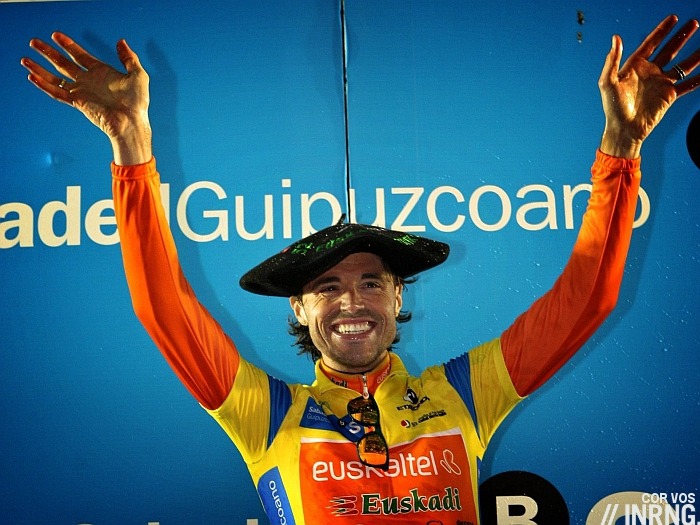
Two small corrections:
1- Despite being the biggest city, Bilbao is not the capital city of the Basque Country. Vitoria-Gasteiz is the capital city of the administrative region and Iruñea-Pamplona the hypothetical capital city of the whole Basque Country.
2- The newspaper is better known as El Correo Español. https://en.wikipedia.org/wiki/El_Correo
Thanks, you’re right twice over and I’ll amend the piece above, another reader had contacted me about Bilbao and Vitoria, now I’ll do the newspaper, sounds similar to the Aujourd’hui en France – Le Parisien newspaper, the same newspaper but with one name for one region and another for the rest of the country.
I can attest to what a great region this is to cycle in, having Spanish in-laws based in Eibar along with a permanent bike in their garage. Bare in mind that the climate in summer can be more like home in S. Wales than the Costa’s.
Definitely still a place for the 50/34 chained here.
Also if visiting avoid red/yellow colour combinations with the bike kit. It to closely matches the colour of the Spanish national flag.
Years ago I was a young boy scout with a map of northern Spain with a dot on and the assignment to get to the dot. Appartently that dot was atop a mountain and every time we asked directions people asked us if we were going to go up the mountain by bike, no we’re hiking we responded. They thought we were crazy. Being from Flanders we thought those people were crazy suggesting to cycle all the way up such a steep mountain. Anyway we got there safe (by foot) and the hike provided lots of fond memories (and probably sore feet as well)
And where else but this site could we possibly get this wealth of information?!?
It has been suggested by Mark Kurlansky, the author of “Cod” that the Basques may also have discovered the New World, or at least the Georges Banks fishing grounds off of Newfoundland. They were bringing in great hauls of cod from unknown fishing grounds, at a time when Britain, the Netherlands and the Scandinavian countries controlled the known areas. But, as fishermen, the Basques never told anyone where they had been !
On another point of trivia, the link to Britain explains the name “Athletic” Bilbao, as opposed to Atletico (which I think was imposed under Franco). see also AC Milan, rather than AC Milano.
Atletico Madrid was founded by Basque students in Madrid. Indeed the translation happened by a Franco’s decree, although the regime then, had already merged Athletic de Madrid with a military team and was named Athletic Aviacion de Madrid (1939) and from 1941 till 1947 Atletico Aviacion.
Feel free to correct me if I’m wrong but I believe David Lopez is another at Sky from the area
PS – Fantastic article as usual
Feel free to correct or suggest as usual, and you’re right he’s from Barakaldo outside Bilbao.
i miss euskaltel-euskadi, they were my favorites growing up and contributed to why i like mountain stages and climbers so much.
It’s sad the way they fell apart, especially in the final year where they had to start recruiting non Basque riders and not because they were a great match for the team but simply because they had points in the same way Ag2r and Lotto were hiring Iranian riders. With their style of riding Euskaltel would make, or at least would have made, a great Pro Conti team today, a must-have invitation for any hilly race.
Was always great to see the mass of Basque fans dressed in orange whenever the TdF hit the Pyrenees.
Great article, thank you.
Also, Jonathan Castroviejo is from Getxo and just bought a new house in Bilbao
Good point, another Euskaltel rider too.
Beautiful region, packed with really steep roads.
Basque language is fascinating as it has absolutely no connection with any other known language, and certainly not with any of the indo european language as latin, greek or celtic.
There are some nice but fanciful theories. Basque country is (very roughly) the heart of that part of (what we know as) Europe which was populated during the Ice Age. People followed the ice line as it receded north. One strange genetic fact is that Basques and Sami people in Lapland are “related”, i.e. they share some gene clusters that are quite uncommon among other Europeans.
Sami, the language they speak today, is a Finno-Ugric language that is not at all related to Basque, but there are several place names in Finland that stem fröm none of the languages spoken there. (Koli, Imatra and Saimaa are examples of such “linguistic relics”.) Putting these two facts together has suggested a theory that claims the language was a sort of Basque that was spoken widely in Europe until Indo-European languages took over and that modern Basque is in fact the last remaining descendant of the language(s) spoken during the Ice Age.
PS I have travelled a bit in Basque country and even had some longer stays in the area. But, alas, that was before I took up cycling and it kind of pains me to think of the cycling opportunities I missed! (I used to be a marathon runner then and I can assure you that the Basques are rather proud of their marathoners as well…)
+1 all round, great reading
And Great food in that part of the world, not the michelin restaurants(I am sure they are good swell), just genuinely good food at local eating places.
the now gone Zeus frame and components manufacturer.
Isn´t Moviestar sercice course based in Pampona(iruna) aswell?
Thanx for nice reading!
Yes, in Pamplona
I logged on today looking for a Flanders review but this article more than made up for it.
Ditto and ditto. Thank you Mr Inrng!
Nice article, I lived for many years in the area, just north of Donastia in the French side. Best place in the world, for many reasons.
Inrng (and once again thank you ) keeps giving us these great cycling articles, outside of mainstream cycling reports (?), I’ll always be a reader of this site.
Dear Mr. Ring,
Please add Greek to the roster of 2013, Ioannis Tamouridis was also part of the team. Sorry for insisting on minor details, but as a Greek fan I am hugely proud and at the same time a little sad that we only had one Pro Tour rider in recent years.
There is a theory that the ancient Britons were, in fact, Basques and not Anglo-Saxons, but don’t tell Farage.
Well, that makes Gibraltar a part of Euskadi then. Case solved. 🙂
One of the greatest places to cycle. It’s such a lovely region. Rides can start or finish at the beach, climb beautiful remote roads and have soaring vistas. Some of the hills are tough. It’s often wet. But… get on an Orbea, pull on some Etxeondo and start pedalling.
The first ride I ever did there we turned off from the busy valley roads went up a hill (and had it to ourselves -no traffic) and went past an old bloke at the top cutting the roadside grass with a scythe! Alas he wasn’t wearing a txapela (beret).
Go visit. The people are lovely. The food is great. And there’s amazing cider!!!
Lovely memories.
I became a BIG fan of the team Euskadi when it appeared in 1994. I really liked the team’s philosophy and how they were created, thanks to Miguel Madariaga and a few of his friends. Thanks to my good friend Mick Tarrant, I was able to obtain the famous Euskadi kit and then later the different versions of the Euskaltel-Euskadi kit. In addition, Mick was instrumental in obtaining a team-issue Zeus Euskadi bike which was Igor Gonzàlez de Galdeano’s spare bike in his first year as a pro with the team, and which I am still riding today, despite the bike being about 20 years old. Mick later sent me a team-issue Orbea Columbus Starship aluminum frame. Eskerrik asko Mick.
I finally had the chance to personally meet the team in October, 1999 at a low-level race in Granada, Andalucia. When I saw the team vehicles in the distance during my walk to their hotel, tears came to my eyes as I realized that I was about to accomplish my dream of meeting my favorite team. Despite the fact that I am not Basque, but American, the team welcomed me with open arms and they were all very happy to sign autographs and pose for photos. I spent a wonderful day with them at the race.
The next year I became a dues-paying, card-carrying member of the Fundaciòn Ciclista Euskadi, and I still am today even though the Fundaciòn has no pro team. Once the Euskaltel-Euskadi obtained Pro Tour status, and began coming to Italy for races, I was able to spend more time with the team. I remember that I even took them on a short training ride the day before the start of a Tirreno-Adriatico which started in Tivoli, just outside of Rome. What a huge emotion that was to be able to ride with my idols, including Vuelta and Tour stage winner Roberto Laiseka! Every time the team came to the Rome area I would go to see them and spend the day as their Tifoso Numero Uno. I had the privilege of spending time in their team cars during stages of the Tirreno-Adriatico and the Giro d’Italia, I had the pleasure of eating meals with the team staff, and I even appeared in the team’s quarterly fan magazine. I was even mentioned as the team’s biggest supporter because I was constantly sending them e-mails of encouragement, congratulations for victories and good results, and even to wish “Urtebetetze On”(happy birthday) to the riders and staff. The team ALWAYS, ALWAYS, ALWAYS treated me with velvet gloves, making me feel part of the Euskaltel-Euskadi family. I always appreciated this, and I did feel quite privileged to be able to live such experiences which very, very few cycling fans can live. Even though the team unfortunately no longer exsists, the riders and staff still recognize me and stop for a quick chat. The proof of this took place a few weeks ago in Rieti at the start of Stage 5 of the Tirreno-Adriatico. Ex-Euskaltel riders Markel Irizar and Mikel Landa recognized me and were more than willing to talk for a few minutes. In addition, I met an ex-team mechanic who works for Movistar and Josu Larrazabal, the Trek-Segafredo coach. Now THAT is what I call fan appreciation.
It was indeed a sad, sad day in cycling when the team folded at the end of 2013. I hope that the Fundaciòn Ciclista Euskadi will be able to create another pro team in the next year or two. In the meantime, I will continue to pay my yearly dues as a member in order to promote the team in their objectives to promote the base level of Basque cycling.
Euskadi and later Euskaltel-Euskadi were rare pro cycling teams in a sport filled with multinational rosters and mercenaries. They rode with passion and until 2013 with their unique philosophy. I miss them dearly, and I wish all the very best.
An enjoyable read Robert
Likewise, thanks for sharing the memories. One of the attractions of the sport has been the access and approachability of teams to fans.
Eskerrik asko!
This is great for two reasons! One is the attention to an area that really has outsized meaning to the sport. Like so many climbers from the region, a small package has immense effect.
But even more, I want to applaud you for the idea of Homes of Cycling. It is a wonderful addition to the blog and even more to the canon of writing on the sport. If I have a choice between polemica and Homes of Cycling, I am coming right here.
I need to buy another jersey or something or find some other way to help you do this. You provide immense value to so many of our days. Thank you!!
We at Prendas Ciclismo have always been staunch supporters of Basque Cycling. As our friend Robert Reis remarked in his contribution above, he bought the original Euskadi kit from us back in ’94. We continued to sell the clothing when produced by Etxe Ondo through all incarnations and were saddened when it was no longer produced in Pais Vasco.
We were even more distraught when the team pulled the plug as they were always the team that punched way above their weight. Remarkable when you consider that almost all of the riders were from a one relatively small area in Spain.
We miss the team and what they represented. However, as mentioned by INRNG in the article above, there is a new Basque team entering the arena. True to our origins, we are proud to offer up the team clothing for Euskadi Murias. Right on cue, it arrived today http://tinyurl.com/n5wp2vp
Yes! Thank you, already bought one from you. Thank you for supporting the region!
I’ve been to this part of the world every summer for the last 20 years, It is a joy to ride there every day, whatever the weather. The food, the people, the culture make it a stunning place in the summer but the winters are hard. It’s a must visit part of Europe. Try the local wine Txakoli and the of course the cider and pintxos. Every village has a “fronton” a central open air plaza to play Pelota, imagine playing tennis with a cricket ball and no racquet. This Basque sport is fascinating and very exciting to watch, the version played with Cestas or baskets is allegedly the fastest sport in the world. I would just like to point out that maybe you underplay the French Basque aspect. There are as many French Basque provinces as Spanish ones and although the French part has never seemed as secessionist as the Spanish, It is definitely, for me not France. Fantastic article, I would certainly like to see more like it.
While cycling and football are important sports in the region, let’s not forget rugby (at least in the French Pays Basque) and, of course, Pelota, that is the real sport that unites all of us basques 🙂
Kaixo Gorka, thanks also to you for the support. Good to see the Ikurriña displayed on a cycling jersey again.